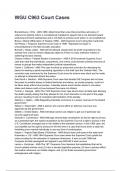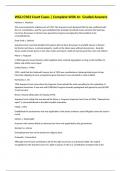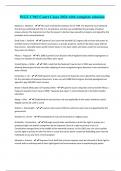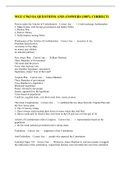Wgu c963 c - Study guides, Class notes & Summaries
Looking for the best study guides, study notes and summaries about Wgu c963 c? On this page you'll find 230 study documents about Wgu c963 c.
Page 3 out of 230 results
Sort by

-
WGU C963 Court Cases questions and answers graded A+ 2024/2025
- Exam (elaborations) • 3 pages • 2024
- Available in package deal
-
- $12.99
- + learn more
WGU C963 Court Cases questions and answers graded A+ 2024/2025
WGU C963 Court Cases Complete Solutions Verified Court Cases

-
WGU C963 Court Cases | Complete With A+ Graded Answers
- Exam (elaborations) • 4 pages • 2024
- Available in package deal
-
- $9.00
- + learn more
WGU C963 Court Cases | Complete With A+ Graded Answers Marbury v. Madison This case involved the Judiciary Act of 1789. The Supreme Court declared that the law conflicted with the U.S. Constitution, and the case established the principle of judicial review wherein the Supreme Court has the power to declare laws passed by Congress and signed by the president to be unconstitutional. Dred Scott v. Sanford Supreme Court case that decided US Congress did not have the power to prohibit slavery in...

-
WGU C963 Court Cases exam questions with complete verified solutions 2024
- Exam (elaborations) • 4 pages • 2024
-
- $14.49
- + learn more
Marbury v. Madison This case involved the Judiciary Act of 1789. The Supreme Court declared that the law conflicted with the U.S. Constitution, and the case established the principle of judicial review wherein the Supreme Court has the power to declare laws passed by Congress and signed by the president to be unconstitutional. Dred Scott v. Sanford Supreme Court case that decided US Congress did not have the power to prohibit slavery in federal territories and slaves, as private propert...
BUNDLE FOR WGU C963 COMPLETE PACK

-
WGU C963 Court Cases 2024 with complete solution
- Exam (elaborations) • 3 pages • 2024
- Available in package deal
-
- $8.49
- + learn more
WGU C963 Court Cases 2024 with complete solution Marbury v. Madison - This case involved the Judiciary Act of 1789. The Supreme Court declared that the law conflicted with the U.S. Constitution, and the case established the principle of judicial review wherein the Supreme Court has the power to declare laws passed by Congress and signed by the president to be unconstitutional. Dred Scott v. Sanford - Supreme Court case that decided US Congress did not have the power to prohibit slavery in ...
WGU C963 Court Cases Exam Questions GRADED A+.
WGU C963 Court Cases Exam Questions GRADED A+.WGU C963 Court Cases Exam Questions GRADED A+.

-
WGU C963 Court Cases Questions with 100% Correct Answers | Verified | Latest Update | 100% Pass
- Exam (elaborations) • 7 pages • 2024
- Available in package deal
-
- $8.49
- + learn more
WGU C963 Court Cases Questions with 100% Correct Answers | Verified | Latest Update | 100% Pass Marbury v. Madison This case involved the Judiciary Act of 1789. The Supreme Court declared that the law conflicted with the U.S. Constitution, and the case established the principle of judicial review wherein the Supreme Court has the power to declare laws passed by Congress and signed by the president to be unconstitutional. Dred Scott v. Sanford Supreme Court case that decided US Congress did not...

-
WGU C963 Court Cases Exam-Answered
- Exam (elaborations) • 4 pages • 2023
- Available in package deal
-
- $10.49
- + learn more
Marbury v. Madison - ANSWER-This case involved the Judiciary Act of 1789. The Supreme Court declared that the law conflicted with the U.S. Constitution, and the case established the principle of judicial review wherein the Supreme Court has the power to declare laws passed by Congress and signed by the president to be unconstitutional. Dred Scott v. Sanford - ANSWER-Supreme Court case that decided US Congress did not have the power to prohibit slavery in federal territories and slaves, as pri...

$6.50 for your textbook summary multiplied by 100 fellow students... Do the math: that's a lot of money! Don't be a thief of your own wallet and start uploading yours now. Discover all about earning on Stuvia






